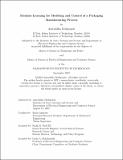Machine Learning for Modeling and Control of a Packaging Manufacturing Process
Author(s)
Deshpande, Aniruddha
DownloadThesis PDF (7.299Mb)
Advisor
Anthony, Brian
Terms of use
Metadata
Show full item recordAbstract
Process control is a key component of industrial automation. Irrespective of the specific product being manufactured, there is always a need for a controller to decide on specific inputs to the system such that the process gives the desired output, which may be product specifications, quality requirements. Many modern industrial processes still use classical PID control, which is quite effective and easy to implement on Programmable Logic Controllers (PLC). However, this control strategy does not account for the dynamics of the process while developing a control policy, thereby fundamentally limiting its performance capabilities. This means that intervention by operators is required often to ensure smooth functioning of the process, and even then large down times which lead to wastage of material and money are all too common.
With the advent of Industry 4.0 however, more and more manufacturing processes are being fitted with a large number of sensors, cameras; which allow us to collect process data at a scale that was not possible before. Modern machine learning methods have become extremely capable of transforming big data into accurate models. This opens up the opportunity of developing sophisticated models or Digital Twins of manufacturing processes which can then be used to develop more advanced control strategies that would improve on the status quo of heuristically tuned PID control. Such models can be used to explicitly derive control strategies or even be used in simulation to learn improved control.
In this thesis we tackle this modeling and control problem for a packaging manufacturing process. We developed a model for the process that is based on a combination of physics based roll to roll models fine-tuned with process data as well as Neural network based NARX models and validate this combined plant model. We then use this model to test out various control strategies in simulation, ranging from classical PID and optimal linear control as well as use these models to further fine-tune these controllers for better performance.
While such improved data driven controller development strategies exist, adoption is still limited. In the final section of this thesis we also explore how this digital transformation is taking place in the wider manufacturing ecosystem. We review key literature, industry surveys and policy documents and synthesize a view on the current state of adoption of AI in manufacturing, its potential impacts, as well as the big hurdles in adoption. We also examine the kinds of policies in place in the United States to tackle this.
Date issued
2023-09Department
Massachusetts Institute of Technology. Department of Electrical Engineering and Computer Science; Massachusetts Institute of Technology. Institute for Data, Systems, and SocietyPublisher
Massachusetts Institute of Technology